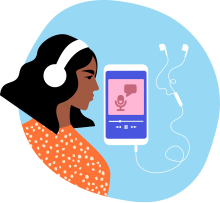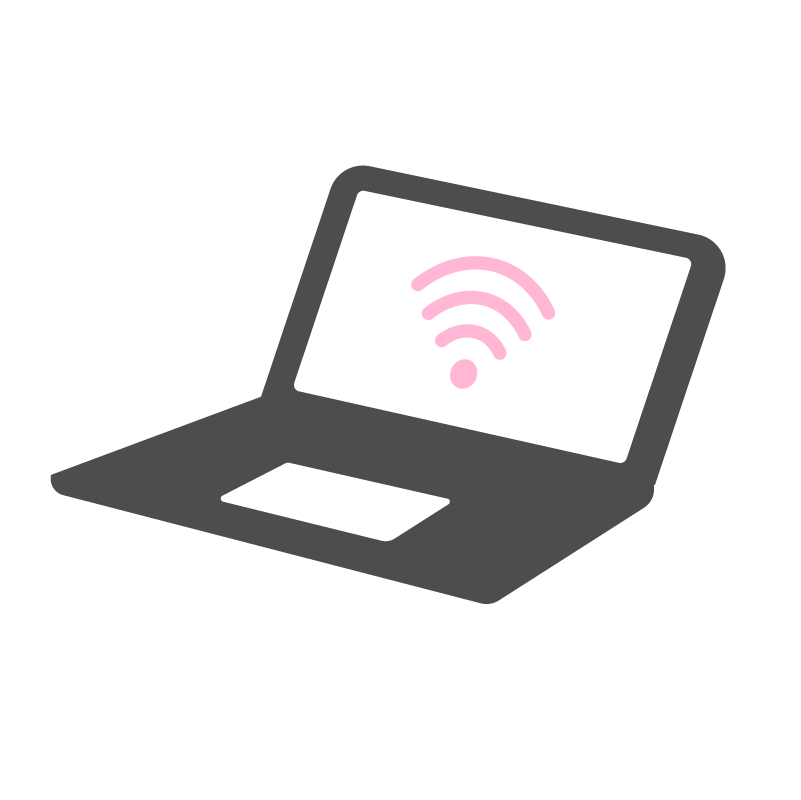Let's talk about it podcast: How to talk to your daughter about puberty

Click on the play button below to listen to the podcast.
00:00:04
Welcome to “Let's talk about it” podcast
00:00:13
Laaha is an open, online platform
00:00:16
where women and girls can get information about their health
00:00:20
wellbeing, and safety
00:00:26
Please remember: All content provided on the platform
00:00:29
is based on scientific knowledge for educational purposes only.
00:00:35
It is not intended to be a substitute for professional medical advice or treatment.
00:00:43
My name is Marian, and today, we'll discuss an important topic
00:00:48
that many parents may find challenging
00:00:51
how to talk to your daughter about puberty
00:01:00
Puberty is a time when your child’s body and feelings start to change as they grow up.
00:01:06
It is a time of big physical and emotional changes for girls
00:01:11
that can start somewhere between the ages of 8-14
00:01:15
It is a good idea to start speaking about puberty
00:01:18
with your daughter as early as ages 8
00:01:22
if you want your daughter to be aware of what changes she can expect
00:01:25
and for her to know that you are a trusted source of information.
00:01:30
If your daughter is already going through puberty
00:01:32
and you haven’t spoken to her yet
00:01:35
it is okay
00:01:36
You are here now and there is still time.
00:01:39
Speaking to your daughter about puberty
00:01:41
can help her feel less alone and scared
00:01:44
during what will be a great time of change for her
00:01:49
Talking about puberty can be tricky
00:01:51
You may feel nervous or feel unprepared
00:01:55
You are not alone
00:01:56
This is a common feeling mothers and female caregivers can have
00:02:01
You will be talking about something that is not usually talked about
00:02:05
body parts like the vagina and breasts and sex
00:02:10
It may be that your mother or other women in your life
00:02:13
never explained anything to you or talked about it
00:02:17
In some places, it may not even be acceptable
00:02:20
for women and girls to speak about these topics
00:02:24
If this is your situation
00:02:26
make sure you can speak with your daughter in a place
00:02:29
that is private and safe for both of you
00:02:32
We have got some tips to help you through the conversation
00:02:36
Tip 1. Use real words
00:02:39
It’s good for kids to know the right names and functions
00:02:42
for all their body parts including their genitals
00:02:46
If you use the real word like vulva or vagina
00:02:49
instead of a code word like “private parts”
00:02:52
or something else you’ll send the message
00:02:55
that there’s nothing wrong, different or weird about these parts of their body
00:03:00
If you haven’t been using words like “vulva” or “uterus”
00:03:04
with your kid until now
00:03:06
that’s okay!
00:03:07
Now is a great time to start
00:03:10
You can say
00:03:11
“You know how we’ve been using the word __?”
00:03:14
“Well, really, it’s called a vagina”
00:03:18
“It’s important to use real words to talk about our bodies”
00:03:21
“so that’s the word I’ll use from now on”
00:03:26
Tip2. Have short talks over time
00:03:30
Puberty is a complex topic to talk about
00:03:33
It is related to a lot of other things for girls
00:03:36
like sex, sexuality, pregnancy, and marriage
00:03:42
You don’t need to and you shouldn’t talk about everything at one time
00:03:47
Instead, think of having conversations about puberty
00:03:51
with your daughter in small steps
00:03:54
You can share a bit of information and see how she reacts
00:03:58
If you notice she is asking questions
00:04:01
it may signal she is ready for more information
00:04:05
The pace of these talks will look different for everyone
00:04:09
But it's important to create an environment
00:04:12
where girls know they can ask questions
00:04:15
without being shamed or silenced
00:04:17
and that mothers answer them as it goes
00:04:21
Having regular conversations also sends the message
00:04:24
that these topics are important enough
00:04:27
to keep bringing up and are a normal part of life
00:04:31
Tip3. It’s okay not to know
00:04:34
You don’t have to have all of the answers!
00:04:37
If your daughter asks a question and you don’t know how to respond
00:04:41
you can always say
00:04:42
Hmm… good question
00:04:45
I love that you’re asking me what’s on your mind
00:04:48
and I want to give you a thoughtful answer
00:04:50
so let me think about it and come back to you
00:04:53
tomorrow/ next week/ etc
00:04:58
Tip4. Respond without judgment
00:05:01
Your daughter will have questions and some of them may be funny
00:05:05
awkward or even shocking to you
00:05:08
Your goal is to answer the questions as calmly as possible and without judgment
00:05:14
Remember your daughter will be watching your reactions to her questions
00:05:19
so it is important that she sees that you are okay with any question she asks
00:05:25
Otherwise, she may shut down and think
00:05:28
“Oh, I shouldn’t have asked that it’s embarrassing or shameful or wrong”
00:05:34
Tip5. Acknowledge her feelings and provide comfort
00:05:40
Puberty brings up a lot of feelings for our children
00:05:43
especially for girls
00:05:45
There can be feelings of loss
00:05:48
Girls may be wondering
00:05:50
“Am I no longer a child anymore? What else in my life will change?”
00:05:55
In societies where girls entering puberty means
00:05:58
that there will be significant social changes
00:06:01
For example - the need to wear hijab or other body coverings
00:06:06
limits to what they can do and where they can go
00:06:10
being forced to drop out of school
00:06:12
the possibility of getting marriage
00:06:15
it will be very important to be clear about these changes
00:06:19
and make space for your daughter to share her feelings and questions
00:06:24
She may also feel fear
00:06:27
This may be anything from
00:06:30
“What if I get my period during school and everyone sees?”
00:06:33
Or “What if this means I will have to get married and have sex?”
00:06:38
She may feel shame
00:06:40
Girls might be shamed by other kids
00:06:42
or society for growing hair, breasts, and having their periods
00:06:47
This can be especially true for girls who go through puberty at an earlier age
00:06:53
She may feel frustration
00:06:55
For example, “Blood will come out of my body?
00:06:59
“Ohh, That feels so weird and uncomfortable”
00:07:03
“it’s like my body is no longer in my control!”
00:07:06
Or
00:07:07
because entering puberty may mean that girls have greater restrictions
00:07:11
on their movement and social interactions
00:07:14
especially with boys, girls may feel frustrated about that
00:07:20
She might also feel excitement
00:07:22
For example, “I feel so grown up!”
00:07:26
Some girls may be excited about these changes
00:07:28
and what it means for them
00:07:30
This may especially be the case in families and cultures
00:07:35
where entering puberty is celebrated
00:07:37
and perhaps affords girls more freedom and status
00:07:41
It is okay to be excited for your daughter
00:07:44
and communicate that to her
00:07:46
but be sure to also make space for her to feel differently than you do
00:07:50
and for her to share that with you
00:07:53
She might feel all of these feelings at the same time
00:07:56
Or different time and others
00:08:00
and her feelings may evolve over time
00:08:03
Be prepared for there to be a range of feelings at different points
00:08:07
As a parent, it is important to try to spot feelings
00:08:11
your daughter may have
00:08:13
and acknowledge them
00:08:15
For example you can share
00:08:18
I wonder if you are feeling X about this
00:08:22
That makes sense
00:08:25
Or you could say
00:08:27
This can be a lot to think about all at once
00:08:30
It would make sense if you are feeling ___.
00:08:34
Even if you guess the wrong feeling
00:08:37
it invites your daughter to say how she is really feeling
00:08:42
Even with all this information you might still be unsure what to say
00:08:46
So, We were gonna offer some script to help you
00:08:51
To introduce the conversation with your daughter you can say
00:08:55
“I want to talk to you about something called puberty”
00:08:59
“Have you heard that word or know what it means?”
00:09:02
“It is totally fine if you haven’t or if you have”
00:09:07
Pause and see what your child share
00:09:10
No matter what they share you can say
00:09:13
"Puberty is a normal, healthy part of growing up”
00:09:17
It's a time when special chemicals in your body called 'hormones'
00:09:21
start to change how your body looks and feels
00:09:25
Some changes you will see, like growing taller and some changes you might not see
00:09:31
but they are happening inside your body
00:09:35
How you can explain emotional changes happening in puberty
00:09:39
you can say
00:09:41
“You may start to feel things more”
00:09:43
“and sometimes they might feel confusing or overwhelming”
00:09:48
“If you start to feel this way, it is okay and it is normal”
00:09:52
“And I want you to know, you can always talk to me”
00:09:56
Here’s how you can explain female anatomy changes that will happen
00:10:02
you can say
00:10:04
Let’s talk about what changes will happen in your body
00:10:07
This way, it won’t be a surprise.
00:10:10
If you haven’t already started using the correct terms for genital body parts
00:10:13
you may want to add here
00:10:16
I’m going to use real words here
00:10:18
to describe body parts which may feel strange
00:10:22
but I want to use real words because those body parts are just like other parts
00:10:27
There is nothing to be ashamed about
00:10:30
It might feel a little weird or awkward to talk about these things
00:10:34
but I’m going to say it
00:10:36
If you want to look away for more privacy, that’s okay
00:10:41
Here how you can talk about body changes with your daughter
00:10:45
you can say
00:10:46
The first thing you might notice is that
00:10:48
you start to sweat more and you may smell different
00:10:52
The skin on your face might start to feel oily
00:10:55
or you may start to notice red or white bumps on your skin
00:11:00
When the time is right, we will talk about
00:11:02
what to do with these changes
00:11:05
You will also start to grow breasts
00:11:07
Around your nipples, you’ll have something called breast buds
00:11:11
which is the first stage
00:11:14
When your breasts start to grow
00:11:15
you can start wearing a bra under your shirts
00:11:19
We can talk about that more when you’re ready
00:11:22
You’ll get some light hair growing around your vagina
00:11:26
maybe some hair under your armpits or on your legs
00:11:30
You’ll also get taller
00:11:32
These are all part of the early stages of puberty
00:11:35
They are all normal and are signs that you are growing the way you should
00:11:41
These changes may feel good or they may not feel good
00:11:45
Either is okay
00:11:47
Here is how you can talk about getting her first period with your daughter
00:11:52
you can say
00:11:53
All of the changes we talked about that will happen in your body
00:11:57
will happen a few years before you get something called your period
00:12:01
your period is when blood comes out of your vagina
00:12:04
for a few days each month
00:12:07
A period is part of what is called a menstrual cycle
00:12:12
which is a process your body goes through
00:12:14
to prepare for having a baby
00:12:17
Getting your period doesn’t mean you will automatically make a baby
00:12:21
or that you are ready to have a baby
00:12:24
it just means your body now has the parts it needs
00:12:27
to help make a baby when you’re older
00:12:31
We can talk more about your period and what to do when it happens
00:12:36
Right now, I just want you to know the basics of what it is
00:12:39
and just a note for parents here
00:12:42
there are other resources on Laaha
00:12:44
to help you talk to your daughter in more detail about periods
00:12:48
and how to manage them
00:12:49
as well as to talk about sex and pregnancy
00:12:53
Talking to your daughter about
00:12:54
When puberty start could goes something like this
00:12:59
Puberty starts at different times and goes at different speeds
00:13:03
You might notice that your friends or schoolmates
00:13:06
develop breasts earlier or faster than you
00:13:09
or you might be the first of your friends to get your period
00:13:13
It doesn’t mean that anything is wrong with you
00:13:16
everyone goes through puberty at the time that’s right for their body
00:13:21
Here is how you can keep the conversation open with your daughter
00:13:25
you can say
00:13:27
Okay, I’m going to stop here
00:13:30
We talked about some important things
00:13:33
and we will continue to have these talks
00:13:35
As your body changes
00:13:37
it’s normal to have lots of feelings and worries about things
00:13:42
I’ll check in with you from time to time
00:13:44
I’d always want you to come to me if you have feelings or worries or questions
00:13:50
You can ask me questions whenever you want
00:13:53
I’ll never be mad, I’ll never be shocked
00:13:57
I’ll never think you have a bad question
00:14:00
I love you very much.
00:14:08
Try to think about the conversations you will have with your daughter
00:14:11
as an opportunity to connect with her and deepen your relationship
00:14:16
It may feel uncomfortable for both of you
00:14:19
But, by doing it, you are showing her that you can sit with her in discomfort
00:14:24
That you are a source of important information for her
00:14:29
and that she can come to you when she has questions or concerns
00:14:33
There are lots of other resources on LAAHA
00:14:35
to help you build on this beginning conversation
00:14:38
and add more specific information as you need to with your daughter
00:14:43
You can find resources on periods
00:14:46
talking about sex, talking about pregnancy
00:14:49
and talking about early marriage







 Let's talk about it podcast: How to talk to your daughter about puberty
Let's talk about it podcast: How to talk to your daughter about puberty